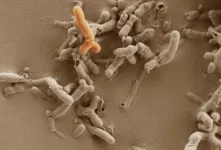(Press-News.org) Today, Rensselaer Polytechnic Institute and Hokkaido University of Japan announced their plan to explore collaborative opportunities in semiconductor education and research contributing to semiconductor workforce development initiatives.
The two universities recognized the new partnership with a letter of intent signing ceremony held in the Curtis R. Priem Experimental Media and Performing Arts Center, with representatives from the Hokkaido Prefecture government, the Japanese semiconductor company Rapidus, IBM, NY CREATES, and RPI faculty and students in attendance.
Before the signing ceremony, the Japanese delegation toured the IBM Quantum System One installed on-site at RPI, the first such system deployed on a university campus in the world. As a completely new branch of computing, quantum systems depend on hardware and systems engineering breakthroughs that are advancing the capabilities of quantum processors.
It is estimated that the world’s semiconductor industry will need to add more than 1 million workers by 2030 to keep up with the demand for chips, which are used in everything from computers and smartphones to cars and appliances.
“RPI was honored to welcome our colleagues from Hokkaido University, Hokkaido Prefecture, and other important guests as we embark on an exciting partnership to support chip manufacturing and innovation,” said Martin A. Schmidt ’81 Ph.D., President of RPI. “Today was an excellent example of how universities, companies, and governments can and must work together to meet the workforce needs of an industry that touches so much of our modern lives.”
“Hokkaido University is accelerating the establishment of a system for the development of advanced human resources and the promotion of research in the field of semiconductors,” said Professor Kiyohiro Houkin, President of Hokkaido University. “I believe that by pursuing a collaborative relationship with Rensselaer Polytechnic Institute, which is conducting research with a progressive approach in semiconductors in the U.S., we will be able to provide higher quality education and contribute to the enhancement of research capabilities.”
“I believe that Hokkaido and Rensselaer Polytechnic Institute have a strong connection. We have a long history and would like to continue building it,” said Naomichi Suzuki, Governor of Hokkaido Prefecture. “We believe that this collaboration between RPI and Hokkaido University will accelerate human resource development efforts in Hokkaido, and we feel that this collaboration is extremely encouraging.”
The RPI-Hokkaido University partnership comes at a key moment in U.S. and Japanese chip manufacturing.
Located in an epicenter of U.S. semiconductor research and manufacturing, RPI is a longtime leader in chips innovation. In Hokkaido, the northernmost island of Japan, Rapidus is building a leading-edge semiconductor manufacturing facility. Rapidus and Hokkaido University recently formed a collaboration around semiconductor education and research, and Rapidus and IBM have also announced a partnership.
“One of our three founding pillars is contributing and furthering human resource capabilities,” said Dr. Atsuyoshi Koike, CEO of Rapidus Corporation. “Close international coordination – throughout academia and industry – is extremely important as we look to collaborate on the global workforce requirements to develop and manufacture cutting-edge semiconductors. We congratulate RPI and Hokkaido University on this latest milestone, which is another vital step in accelerating workforce advancement.”
Earlier in the day, the Japanese delegation visited the Albany Nanotechnology Center, where NY CREATES, Empire State Development, and Governor Suzuki recognized a partnership in support of the global semiconductor industry.
END
RPI and Hokkaido University sign letter of intent for semiconductor collaboration
The collaboration will support global workforce needs in the chips industry
2024-08-21
ELSE PRESS RELEASES FROM THIS DATE:
Just 1-2 cigarettes/day before or during pregnancy linked to major newborn health problems
2024-08-21
Even light smoking of just 1-2 cigarettes a day either before or at any time during pregnancy is significantly associated with major health problems in the newborn, finds research published online in the Journal of Epidemiology & Community Health.
The findings add to the evidence indicating that women hoping to become, or who are, pregnant should stub out smoking to protect their newborn’s health, say the researchers.
Deaths and serious health issues among newborns have fallen sharply, largely due to improvements in maternity care. But admission ...
Social position linked to food delivery preferences in England
2024-08-21
Social position—defined by household income and job role—is linked to food delivery preferences in England, suggests an analysis of consumer research published in the open access journal BMJ Public Health.
Affluent households are twice as likely as less well off ones to shop online for groceries while households in lower social grades are up to twice as likely to use food delivery apps for take-away meals. And users of these apps are more likely to be living with obesity, the findings indicate.
Digital on-demand ...
20 minutes of mindful breathing can rapidly reduce intensity of cancer pain
2024-08-21
Twenty minutes of mindful breathing, which focuses a person’s attention on their breath, can rapidly reduce the intensity and unpleasantness of cancer pain and relieve the associated anxiety, suggest the findings of a small comparative study, published online in the journal BMJ Supportive & Palliative Care.
Mindful breathing complements traditional pain relief and broadens the repertoire of options available for cancer patients, say the researchers.
Moderate to severe pain affects an estimated 30-40% of patients with cancer worldwide, as a result of the tumour compressing or ...
Hospital bacteria tracked better than ever before with new technique
2024-08-21
Researchers have developed a new genomic technique that can track the spread of multiple superbugs in a hospital simultaneously, which could help prevent and manage common hospital infections quicker and more effectively than ever before.
The proof-of-concept study, from the Wellcome Sanger Institute, the University of Oslo, Fondazione IRCCS Policlinico San Matteo in Italy, and collaborators, details a new deep sequencing approach that captures all the common infectious bacteria in a hospital at once. Current methods culture and sequence all pathogens separately which takes longer and requires more work.
Published ...
Red and processed meat consumption associated with higher type 2 diabetes risk, study of two million people finds
2024-08-21
Meat consumption, particularly consumption of processed meat and unprocessed red meat, is associated with a higher type 2 diabetes risk, an analysis of data from 1.97 million participants, published today in The Lancet Diabetes and Endocrinology, has found.
Global meat production has increased rapidly in recent decades and meat consumption exceeds dietary guidelines in many countries. Earlier research indicated that higher intakes of processed meat and unprocessed red meat are associated with an elevated risk of type 2 diabetes, but the results have been variable and not conclusive.
Poultry ...
Environmental laws failing to slow deforestation
2024-08-21
Australia’s environmental laws are failing to stop high rates of tree clearing to make way for agriculture, development and mining, according to University of Queensland research.
PhD candidate Hannah Thomas from UQ’s School of the Environment led a team which used satellite mapping and land clearing data to analyse vegetation loss across northern Australia, including Queensland, the Northern Territory and Western Australia.
“We mapped clearing greater than 20 hectares and then investigated which national or state and territory laws were likely to apply,” Ms Thomas said.
“Of the 1.5 million hectares ...
Mother’s gut microbiome during pregnancy shapes baby’s brain development
2024-08-21
A study in mice has found that the bacteria Bifidobacterium breve in the mother’s gut during pregnancy supports healthy brain development in the fetus.
Researchers have compared the development of the fetal brain in mice whose mothers had no bacteria in their gut, to those whose mothers were given Bifidobacterium breve orally during pregnancy, but had no other bacteria in their gut.
Nutrient transport to the brain increased in fetuses of mothers given Bifidobacterium breve, and beneficial changes were also seen in other cell processes relating to growth.
Bifidobacterium breve is a ‘good bacteria’ that occurs naturally in our ...
Humpbacks are among animals who manufacture and wield tools
2024-08-21
In a study published today in Royal Society Open Science, researchers at the Marine Mammal Research Program (MMRP) at UH Hawaiʻi Institute of Marine Biology (HIMB) and Alaska Whale Foundation (AWF) consider a new designation of the humpback whales they study: tool wielders. Researchers have known that humpback whales create “bubble-nets” to hunt, but they have learned that the animals don’t just create the bubble-nets; they manipulate this unique tool in a variety of ways to maximize their food intake in Alaskan feeding grounds. This novel research demystifies a behavior key to the whales’ survival and offers a compelling case for including humpbacks among the rare ...
UTA federal research expenditures doubled in 2023
2024-08-20
In 2023, federally sponsored research at The University of Texas at Arlington accounted for $77 million in expenditures, with about $40.7 million spent on research-related goods and services in Texas. That more than doubles the total for 2022, when federally sponsored research at UTA contributed $38 million to the economy.
The $77 million is a portion of UTA’s $122 million in total research expenditures from all sources last year. This number includes federally sponsored research awards as well as those from local and state governments, private institutions, and other sources. Overall, UT Arlington and its 270,000 alumni contribute $29 billion ...
Researchers teaching artificial intelligence about frustration in protein folding
2024-08-20
Scientists have found a new way to predict how proteins change their shape when they function, which is important for understanding how they work in living systems. While recent artificial intelligence (AI) technology has made it possible to predict what proteins look like in their resting state, figuring out how they move is still challenging because there is not enough direct data from experiments on protein motions to train the neural networks.
In a new study published in the Proceedings of the National Academy of Sciences on Aug.20, ...
LAST 30 PRESS RELEASES:
Bureaucracy Index 2026: Business sector hit hardest
ECMWF’s portable global forecasting model OpenIFS now available for all
Yale study challenges notion that aging means decline, finds many older adults improve over time
Korean researchers enable early detection of brain disorders with a single drop of saliva!
Swipe right, but safer
Duke-NUS scientists identify more effective way to detect poultry viruses in live markets
Low-intensity treadmill exercise preconditioning mitigates post-stroke injury in mouse models
How moss helped solve a grave-robbing mystery
How much sleep do teens get? Six-seven hours.
Patients regain weight rapidly after stopping weight loss drugs – but still keep off a quarter of weight lost
GLP-1 diabetes drugs linked to reduced risk of addiction and substance-related death
Councils face industry legal threats for campaigns warning against wood burning stoves
GLP-1 medications get at the heart of addiction: study
Global trauma study highlights shared learning as interest in whole blood resurges
Almost a third of Gen Z men agree a wife should obey her husband
Trapping light on thermal photodetectors shatters speed records
New review highlights the future of tubular solid oxide fuel cells for clean energy systems
Pig farm ammonia pollution may indirectly accelerate climate warming, new study finds
Modified biochar helps compost retain nitrogen and build richer soil organic matter
First gene regulation clinical trials for epilepsy show promising results
Life-changing drug identified for children with rare epilepsy
Husker researchers collaborate to explore fear of spiders
Mayo Clinic researchers discover hidden brain map that may improve epilepsy care
NYCST announces Round 2 Awards for space technology projects
How the Dobbs decision and abortion restrictions changed where medical students apply to residency programs
Microwave frying can help lower oil content for healthier French fries
In MS, wearable sensors may help identify people at risk of worsening disability
Study: Football associated with nearly one in five brain injuries in youth sports
Machine-learning immune-system analysis study may hold clues to personalized medicine
A promising potential therapeutic strategy for Rett syndrome
[Press-News.org] RPI and Hokkaido University sign letter of intent for semiconductor collaborationThe collaboration will support global workforce needs in the chips industry







